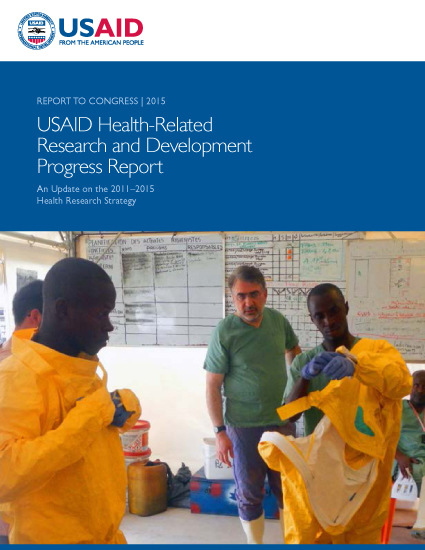Speeches Shim
In 2015, the global community established the Sustainable Development Goals (SDGs) and celebrated gains in reducing maternal, newborn, and child mortality. However, the vision of a world where all countries achieve under-5 mortality rates on par with industrialized countries is not guaranteed. Research played a pivotal role in the establishment of key milestones that will be critical to achieving newly outlined goals. In the words of President Barack Obama,“Science is more essential for our prosperity, our security, our health, our environment, and our quality of life than it has ever been before … our obligations as Americans are not just to ourselves but to all posterity.”
I am pleased to introduce the U.S.Agency for International Development’s (USAID’s) 2015 Health-Related Research and Development Progress Report. Guided by a multi-year health-related research strategy and specific research goals, USAID’s research and development portfolio continues to answer President Barack Obama’s call through its investments in scientific research, technology, and innovation. USAID’s work provides the evidence base for the introduction and scale-up of simple and affordable health interventions to improve the lives of families in the poorest nations.The fact that we can define our goals in terms of Ending Preventable Child and Maternal Deaths,Achieving an AIDS-Free Generation, and Protecting Communities from Infectious Diseases is a testament to the significant progress that has been made.The momentum that has carried us this far must be sustained, and we must continue to recognize the importance of a systematic approach to research, innovation, and research utilization in achieving this vision.
USAID uses scientific research to help build the capacity of health systems around the world to prepare for, identify, and respond to public health emergencies. Disease outbreaks in 2015 emphasized the importance of strong health systems – the absence of which can result in the rapid spread of infectious diseases such as Ebola and Zika. USAID’s work with the international community and local partners to fight Ebola demonstrated the necessity of increasing global collaboration.Through Fighting Ebola:A Grand Challenge for Development – a partnership with the whole of U.S. Government, including USAID, the White House Office of Science and Technology Policy, the U.S. Centers for Disease Control and Prevention, and the Department of Defense – solutions for healthcare workers, such as new personal protective equipment, were developed that are safer, more comfortable, and help facilitate provision of care. We used a rigorous process of evidence-generation to help end the epidemic, restore primary health services, and bolster health systems to prevent future outbreaks from becoming global threats.
Additionally as a result of USAID support, advances in combating malaria with two new drugs are in the final stages of clinical trials – offering potential alternatives to current therapies, which are beginning to be threatened by antimicrobial resistance. Progress continues on developing a range of options for women-initiated tools for HIV prevention, including support for a pivotal study of the dapivirine vaginal ring. Investments directed at strengthening national TB strategies and programs have helped enable access to new and improved drug therapies in countries with the highest rates of TB, drug-resistant TB, and HIV-associated TB.Through global collaborations, advancements in the field of implementation research have helped enable the generation of new knowledge to improve implementation, scale-up, and overall health status. Finally, our experience in partnering with the private sector has enabled us to better mobilize resources, broaden our design efforts, and strengthen implementation for more effective outcomes in host countries.
Advances in health research and innovation are the building blocks for public health and economic growth. If we are to achieve our public health goals, we must continue to invest in and support research and development, introduction, and scale-up of breakthrough tools, technologies, and interventions.The challenge before us is to sustain and expand the progress and achievements that have led to saving and improving millions of lives around the world.


Comment
Make a general inquiry or suggest an improvement.